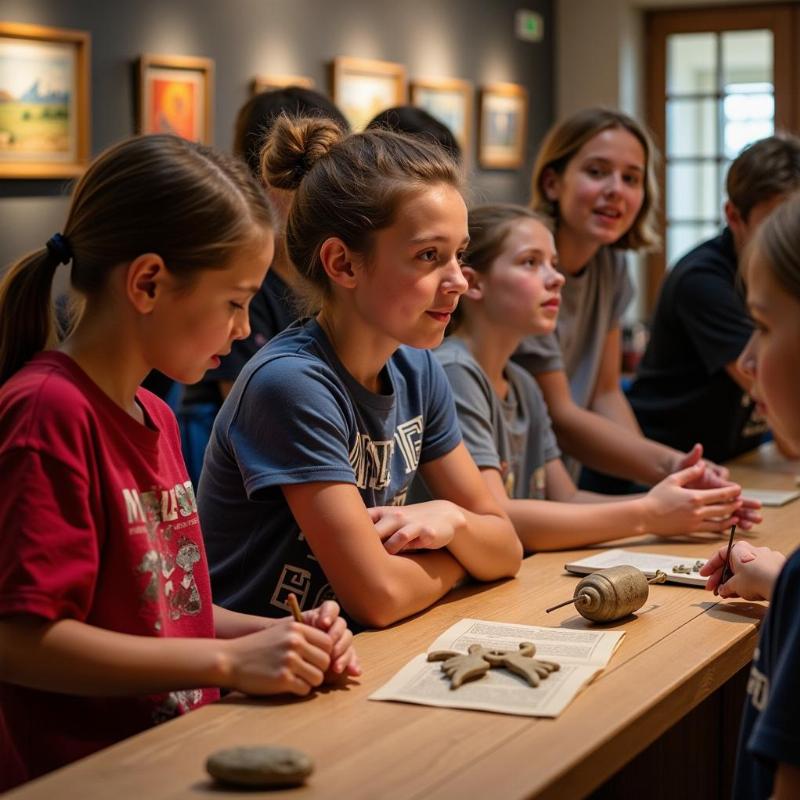Planning an educational tour requires careful consideration and preparation. A well-structured notice plays a crucial role in communicating essential information effectively, ensuring a smooth and enriching experience for everyone involved. This guide provides valuable insights into crafting a comprehensive notice on educational tours, covering everything from pre-planning stages to post-trip evaluations.
Essential Elements of an Educational Tour Notice
A comprehensive notice should address key details, leaving no room for ambiguity. This ensures that all participants are well-informed and prepared for the journey. What makes a notice truly effective? It’s the clarity and conciseness with which it conveys vital information.
Defining the Purpose and Objectives
Clearly state the educational purpose of the tour. Is it to supplement classroom learning, provide practical experience, or expose students to different cultures? Highlighting the learning objectives helps participants understand the expected outcomes of the trip. Are you aiming to enhance historical knowledge, develop scientific observation skills, or foster intercultural understanding?
Trip Itinerary and Logistics
A detailed itinerary outlining the planned activities, destinations, and timelines is essential. This provides a clear overview of the tour’s structure, enabling participants to anticipate and prepare for each day’s events. Include specific details like departure and arrival times, transportation arrangements, and accommodation details.
Cost and Payment Procedures
Transparency regarding the tour cost is crucial. Clearly specify the total amount, what it covers (transportation, accommodation, meals, entry fees, etc.), and payment deadlines. Offer flexible payment options if possible to accommodate varying financial situations. Are installments allowed? Is there a scholarship opportunity available?
Safety and Emergency Procedures
Address safety guidelines and emergency procedures. Include contact information for trip organizers, local emergency services, and the school/institution. This reassures parents and students that their well-being is a top priority. Specify any necessary medical information or dietary restrictions participants need to disclose.
Consent and Permissions
Clearly state the requirement for parental/guardian consent and any necessary permissions for minors participating in the tour. Provide consent forms and instructions on how to submit them. Ensure compliance with all relevant school/institutional policies regarding student travel.
Frequently Asked Questions (FAQ)
- What if a student falls ill during the tour? A designated teacher/chaperone will accompany the student to a local medical facility. Parents/guardians will be informed immediately.
- Are there any specific dress code requirements for the tour? Comfortable and appropriate attire for the visited locations is recommended. Specific instructions will be provided in the detailed itinerary.
- Can students bring personal electronic devices? Yes, students may bring personal devices, but they are responsible for their safety and appropriate usage.
- What is the refund policy if a student cancels their participation? The refund policy is detailed in the tour registration form. It varies depending on the timing of the cancellation.
- Will there be opportunities for students to purchase souvenirs? Time for souvenir shopping will be allocated at designated locations, as mentioned in the itinerary.
- How will students be supervised during the tour? A sufficient number of teachers/chaperones will be present to supervise students throughout the tour.
- What are the accommodation arrangements for the tour? Students will be accommodated in safe and comfortable hotels/hostels, details of which will be provided in the itinerary.
Crafting an Effective Notice
An effective notice is not merely informative but also engaging. Use clear and concise language, avoiding jargon or technical terms. Maintain a professional yet approachable tone.
Addressing the Target Audience
Tailor the notice to the specific audience. A notice for younger students might use simpler language and visuals than one for older students. Consider the cultural background of the participants and adapt the tone and content accordingly.
 Educational Tour Students Exploring
Educational Tour Students Exploring
Conclusion
A well-crafted notice on educational tours ensures a successful and enriching experience. By addressing all essential elements and following best practices, educators can create a document that empowers students and fosters a sense of excitement for the journey ahead. Remember that clear communication is key to a smooth and memorable educational tour.
PlaTovi, a leading travel company in India, specializes in crafting unforgettable travel experiences. From traditional packaged tours to customized itineraries, we cater to diverse travel needs. We also offer hotel and resort bookings, international and domestic flight bookings, event organization, car rentals, and visa assistance. Let PlaTovi help you plan your next educational tour! Contact us at [email protected] or call us at +91 22-2517-3581.